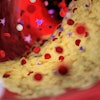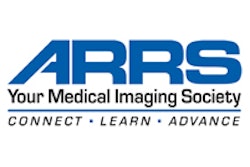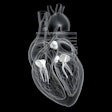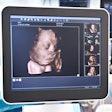
The 23rd International Congress of Radiology featured 200 speakers and panelists from 20 nations at Montreal's Palais des Congrès from June 25-29.
Ten sponsoring societies participated in the trilingual meeting, including the two host societies, the International Society of Radiology (ISR) and the Canadian Association of Radiologists (CAR). Also contributing to the program were the InterAmerican College of Radiology (IACR), the Radiological Society of North America (RSNA), the French-Canadian Society of Radiology, the Canadian Association of Medical Radiation Technologists (CAMRT), the Quebec Order of Radiologic Technologists (OTRQ), the American Roentgen Ray Society (ARRS), the French Society of Radiology (SFR), and the American College of Radiology (ACR).
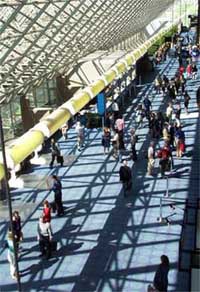 |
| The afternoon sun streams into Montreal's Palais des Congrès during the 2004 International Congress of Radiology. |
The ICR, born in London in 1925, is hosted in a different country every two years under the auspices of the International Society of Radiology. AuntMinnie.com was on hand throughout the 2004 meeting to cover the highlights, including a talk on how PACS can render radiologists obsolete, presented by Dr. Paul Chang from the University of Pittsburgh Medical Center in Pennsylvania.
Chang warned that if radiologists are to survive in a world where medical images are instantly available to clinicians on demand, they must re-engineer themselves as completely as the technology they use has transformed the workplace. In short, they must think in terms of how they can add value to patient care, then take steps to do so.
"In many ways the hard part about changing the way we practice radiology around the world has nothing to do with technology, and everything to do with changing ourselves," Chang said.
Colorful history, bright future for U.K. radiographers
Radiographer Richard Price, from the University of Hertfordshire in the U.K., discussed the unique and growing scope of radiographers’ responsibilities under the country's National Health Service.
Radiographers in the U.K. have a long history of providing medical care and advice in the practice, he said. The group's periodic surveys over the years have shown that their responsibilities are growing.
 |
|
Palais des Congrès. |
The most commonly performed extended-role tasks for radiographers include IV injections (95% of respondents), barium enemas and meals (79% to 86% of respondents), reporting results, and the "red-dot" system, in which radiographers are tasked with marking patient files for the radiologist's review that they believe may contain suspicious findings.
Over the past several years, the National Health Service has been working to develop a four-tier system reflecting different levels of radiographers, with separate practice and educational requirements for each of the four levels, including "assistant practitioner," "practitioner," "advanced practitioner," and the highest level, "radiographer consultant." A master’s degree could well be the highest required level of education, Price said.
Breast cancer deaths down in Canada
 |
|
Montreal skyline from Palais des Congrès.
|
Dr. Nancy Wadden, professor of radiology at Memorial University of Newfoundland and one of Canada’s leading breast-screening advocates, discussed how Canada's comprehensive breast-screening programs are leading to better outcomes throughout the provinces.
Despite a rise in the incidence of breast disease, the death rate in Canada from breast cancer has dropped by nearly 4% since 2000, "and we need to take credit for some of it," Wadden said.
Wadden and colleagues backed their suspicions up with a study of screening program participation rates. The group concluded that women participating in a breast cancer screening program had a statistically significant lower stage of disease at the time of diagnosis than women who had never participated.
CT dominates PE imaging
In CT of the chest, PE pioneers Dr. John Mayo from the University of British Columbia, Canada, and Dr. Martine Rémy-Jardin from the University of Lille, France, covered the world of acute and chronic pulmonary embolism.
CT has become the dominant modality for ruling out acute pulmonary embolism, Mayo said. The thoracic radiologist from Vancouver General Hospital in British Columbia discussed scanning and interpretation tips, the range of pathologies one can encounter in the scans, and new developments and controversies surrounding the exam, from CAD systems to the addition of CT venography to the standard CT exam to rule out PE.
Ultrasound goes global
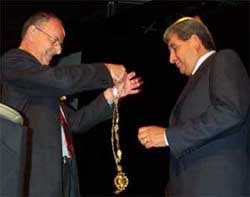 |
|
Dr. George Klempfner from Malvern, Australia, passes the presidential medallion to Dr. Francisco Arredondo from Francisco Marroquin University in Guatemala City, Guatemala. |
The Fuchs lecture, presented by Dr. Barry Goldberg, professor of radiology at Thomas Jefferson Medical College in Philadelphia, discussed an acclaimed and enormously successful program aimed at teaching ultrasound to physicians around the world.
On average the Thomas Jefferson University's ultrasound education center trains about 1,000 physicians, physicists, and paramedical personnel from around the world each year. Much of the training now takes place in the developing countries where the physicians will serve, he said; simple economics dictated that bringing everyone to the U.S. for training wasn’t the most cost-effective way to place skilled ultrasound physicians around the world.
In January 2005 the "Teaching the Teachers" program will begin training personnel in in the Caribbean, Central, and South America. A free newsletter chronicling the group’s activities is available at jeffline.tju.edu.
Radiology into Africa
At the closing ceremony on June 29, ISR president Dr. George Klempfner from Malvern, Australia, passed the reins of leadership to Dr. Francisco Arredondo from Francisco Marroquin University in Guatemala City, Guatemala. Arredondo will serve as ISR president for "Radiology into Africa," the organization’s 24th international meeting, to be held in Cape Town, South Africa from September 12-16, 2006. More information on ISR 2006 is available at www.isr2006.co.za.
Read about the 2002 ICR meeting in Cancun, Mexico, here.
By Eric Barnes
AuntMinnie.com staff writer
Copyright © 2004 AuntMinnie.com



